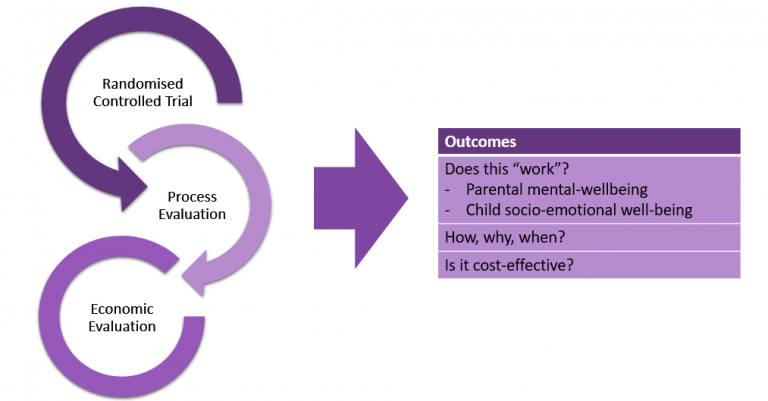The Together study is a national 4-year study funded by the National Institute for Health Research (NIHR). We are evaluating a parenting programme called Strengthening Families, Strengthening Communities to assess whether the programme is working in helping those who attend to feel better in themselves, feel less stressed and generally being more able to cope with looking after their families. We will also assess if the programme has an effect on children’s behaviour and well being.
The best way to examine whether the programme works is for half the parents taking part in the study to have SFSC sooner and the other half to wait a bit longer (~9 months) while able to access most usual services (an active waitlist). The time a parent will wait is decided by a computer and parents involved in the study have an equal chance of either to ensure there is an even mix of parents in each group. This type of study approach is called a Randomised Controlled Trial (RCT) and means the study can properly compare parents who get the programme with a similar group of parents who do not.
Randomised Controlled Trials like this are commonly used in many medical and health (including public health) research projects and is considered the ‘gold-standard’ (when conducted appropriately). We are also conducting a nested process evaluation with economic evaluation to understand the broader context of how, who and when this might work best and how cost-effective this might be. Each area of our work is explained further:
A Randomised Controlled Trial
This multi-centre waiting-list control RCT will evaluate the SFSC programme. Across 7 urban areas of England where ethnically and socially mixed communities live, the parenting programme will be offered to families who either self-refer or who have been referred by professionals. Participants will be 676 parents of children aged 3-18 years agreeing to take part in the study. These parents will be randomly allocated to either immediately starting the programme (intervention arm) or having to wait for a 10-month period before starting it (control arm).
Process Evaluation
The process evaluation will have a mixed methods design. Quantitative components will run continuously through both the internal pilot and full trial phases. Notably we will collect the following data throughout:
Routine data on programme recruitment, registration, referrals, attendance, retention and staffing. Client engagement – participation, reach, dose received (number of sessions attended), and retention rate (overall rates and in particular with reference to disadvantaged and ethnic diversity of sample) will also be recorded.
Fidelity measure to be completed by staff delivering the programme at the end of each session and completion of programme
Researcher observation of programme sessions (independent assessment of fidelity) in random sample of programmes delivered across the seven areas where programme is delivered.
Economic evaluation
We will undertake a detailed cost analysis to estimate the costs of delivering the SFSC programme, including: development and training of accredited providers; the cost of delivering the group sessions; participant monitoring activities; and any follow-up/management. Resource use data will be collected on NHS, social care, criminal justice system, and education contacts. To facilitate analyses taking a societal perspective we will also collect direct costs to trial participants and families (e.g., travel costs to attend group sessions), informal care provided by family and friends, and productivity losses. Unit costs for public sector resources will largely be derived from local and national sources and estimated in line with best practice.

 Close
Close

